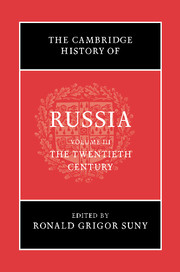Book contents
- Frontmatter
- Introduction
- 1 Reading Russia and the Soviet Union in the twentieth century: how the ‘West’ wrote its history of the USSR
- Part I Russia and the Soviet Union: The Story through Time
- 2 Russia’s fin de siècle, 1900–1914
- 3 The First World War, 1914–1918
- 4 The revolutions of 1917–1918
- 5 The Russian civil war, 1917–1922
- 6 Building a new state and society: NEP, 1921–1928
- 7 Stalinism, 1928–1940
- 8 Patriotic War, 1941–1945
- 9 Stalin and his circle
- 10 The Khrushchev period, 1953–1964
- 11 The Brezhnev era
- 12 The Gorbachev era
- 13 The Russian Federation
- Part II Russia and the Soviet Union: Themes and Trends
- Bibliography
- Index
- References
10 - The Khrushchev period, 1953–1964
from Part I - Russia and the Soviet Union: The Story through Time
Published online by Cambridge University Press: 28 March 2008
- Frontmatter
- Introduction
- 1 Reading Russia and the Soviet Union in the twentieth century: how the ‘West’ wrote its history of the USSR
- Part I Russia and the Soviet Union: The Story through Time
- 2 Russia’s fin de siècle, 1900–1914
- 3 The First World War, 1914–1918
- 4 The revolutions of 1917–1918
- 5 The Russian civil war, 1917–1922
- 6 Building a new state and society: NEP, 1921–1928
- 7 Stalinism, 1928–1940
- 8 Patriotic War, 1941–1945
- 9 Stalin and his circle
- 10 The Khrushchev period, 1953–1964
- 11 The Brezhnev era
- 12 The Gorbachev era
- 13 The Russian Federation
- Part II Russia and the Soviet Union: Themes and Trends
- Bibliography
- Index
- References
Summary
The Twentieth Congress of the Soviet Communist Party convened on 14 February 1956 in the Great Kremlin Palace. On 25 February, the day the congress was slated to end, Soviet delegates attended an unscheduled secret session at which their leader, Nikita Khrushchev, talked for nearly four hours with one intermission. His speech was a devastating attack on Joseph Stalin. Stalin was guilty of ‘a grave abuse of power’. During his reign ‘mass arrests and deportation of thousands and thousands of people, and execution without trial or normal investigation, created insecurity, fear, and even desperation’. Stalinist charges of counter-revolutionary crimes had been ‘absurd, wild and contrary to common sense’. Innocent people had confessed to such crimes ‘because of physical methods of pressure, torture, reducing them to unconsciousness, depriving them of judgement, taking away their human dignity’. Stalin himself had been personally responsible for all this: he ‘personally called in the interrogator, gave him instructions, and told him which methods to use, methods that were simple – to beat, beat and once again, beat’. ‘Honest and innocent Communists’ had been tortured and killed. Khrushchev assailed Stalin for incompetent wartime leadership, for ‘monstrous’ deportations of whole Caucasian peoples, for a ‘mania of greatness’, and ‘nauseatingly false’ adulation and self-adulation.
Khrushchev’s indictment was neither complete nor unalloyed. The Stalin he portrayed had been a paragon until the mid- 1930s. Although oppositionists had not deserved ‘physical annihilation’, they had been ‘ideological and political enemies’. Khrushchev not only spared Lenin and the Soviet regime itself, he glorified them, but his speech stunned his audience.
Keywords
- Type
- Chapter
- Information
- The Cambridge History of Russia , pp. 268 - 291Publisher: Cambridge University PressPrint publication year: 2006
References
- 3
- Cited by

